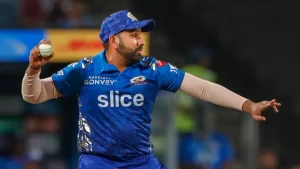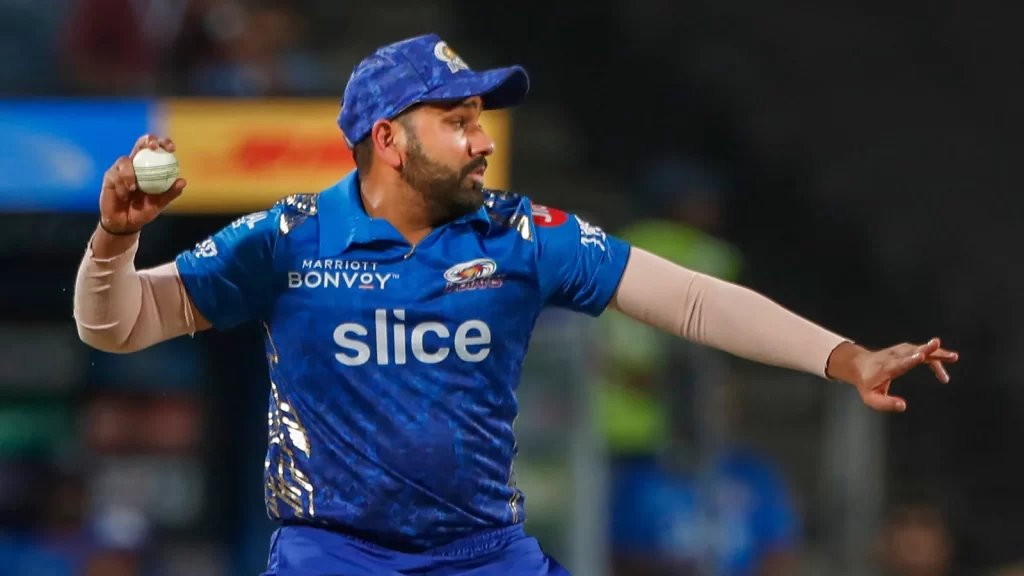
By Boria Majumdar
It is a big test for him tonight. Back at the Wankhede against MS Dhoni’s Chennai, Rohit Sharma will have to lead Mumbai back to winning ways. Getting used to life without Jasprit Bumrah, it isn’t for Rohit to play without his main strike bowler. But there aren’t many options either. After a poor season last year, many will question his captaincy if Mumbai don’t do well this year. And he knows that well. All his life, he has been asked these questions. Can he be a Test player? Can he be a good captain? Can he open in red-ball cricket? Rohit isn’t alien to intense scrutiny and more often than not, has come up with a strong riposte. Can he do it one more time tonight?
He is one of the most composed members of the team. Always sporting a friendly smile, Rohit Sharma is a very different personality to Virat Kohli, for example, on the field. If Virat is passionate and aggressive, Rohit is composed and measured. And yet there is a deep commitment to his cause, something that has only intensified in the last few years with Rohit rediscovering himself as a Test player. With Test and white-ball captaincy coming his way, Rohit knows he is forever in the media glare at the moment.
Personally speaking, I have seen Rohit evolve as a cricketer and, in the process, seen him grow as a leader. It was the end of February 2020 and the world hadn’t yet come to terms with the full fury of the Covid virus. Travel in India hadn’t stopped and masks weren’t a feature of our lives just yet. It was India before Corona. Rohit could still walk around in his hotel in Bengaluru posing for photographs with fans and there was a degree of sanity all round. He wouldn’t have to sanitise hands following every handshake, and a hug was the norm and not an exception. In all this normal, however, there was something that wasn’t.
There was a degree of restlessness in Rohit, which I found out when I met him for a conversation close to the end of his rehab at the NCA on 25 February 2020. Rohit had hurt his hamstring in New Zealand and was back in India midway through the tour, forced to miss the two Test matches he was so looking forward to playing. He was in red-hot form in the white-ball leg of the tour and just a few months earlier had scored five hundreds in the 2019 World Cup, the highest by any batsman in the tournament’s history. To get injured yet again when in such form was terribly unfortunate.
It was the first time I had seen Rohit since that fateful day in Manchester in July 2019 when India lost to New Zealand in the World Cup semi-final, and it was expected that the conversation would turn to it at some point. “The five hundreds really don’t mean much anymore,” Rohit said in a very matter-of-fact manner. “Personally, it was a great achievement but when you are playing a team sport it is never about personal milestones. When I reached home after the World Cup and everyone was congratulating me for the hundreds, I can very honestly tell you I did not feel any elation. The real prize was in the England dressing room and it was difficult to accept that we had not made the final.”
As he was getting miked up for the interview, a long conversation which wasn’t eventually broadcast because of Covid, Rohit was mumbling something to himself. He seemed a little distracted and we couldn’t make sense of what was going on. Seeing us slightly anxious, he smiled and said, “World Cup jeetna hai. This is one obsession we have to fulfil.”
As captain, winning continues to be his obsession.
He was speaking to himself more than he was speaking to me. He is desperate to win and it was as if his legacy as a cricketer was dependant on it.
That’s what it is all about for one of the best of our era. Rohit is a leader, and for someone of his calibre it is never about individual glory. As one of the most successful captains in franchise cricket, Rohit knows how to win and losing is not something he can accept.

To understand Rohit, we really need to understand the man’s mind for only then can you make sense of some of his decisions. For example, it was an easy solution for Rohit to opt out of the 2021 Australia tour. Having won a fifth IPL title with the Mumbai Indians in November 2020, he was the toast of the nation and conversations were all about whether he should replace Virat as India’s white-ball captain. While it has finally happened and he is indeed the leader, such comparisons have been a social-media pastime for months.
Having come back to India to tend to his father who was infected with Covid in November 2020, Rohit could have decided on skipping the Australia tour, undergone a full-fledged rehab at the NCA and been ready for the England tour at home in February 2021. It was logical to do so because a 14-day hard quarantine awaited him in Australia if he decided to travel down under in Covid times. Rohit had not travelled with the team and that meant he would be denied the privileges offered to them. They were moving from one bio-secure bubble in the UAE to another in Sydney and as a result were allowed to train while serving the mandatory two weeks of quarantine. In Rohit’s case, things were different. He would have to fly a commercial airline and that meant he wouldn’t be allowed to train for 14 days and would be confined to a hotel room, which could impact his recovery. In contrast, rehab at the NCA was the more prudent option for cricket in India was gradually restarting and Rohit could be ready for Test cricket by early 2021.
This is how we tend to think. Not so Rohit. “I decided to travel to Australia for that’s what I think is right,” said Rohit in one of our many conversations during the 14-day quarantine in Sydney. “This is very difficult I can assure you and I can also tell you I wouldn’t do this ever again. In fact, no one should have to go through this. It is that hard. Having said that, I am convinced I did the right thing for my dream is to play Test cricket for India and it is only fair that I live my dream.”
It was fair that I asked him the dreaded follow-up question. Did failure ever crop up in his mind? Was he not afraid that he would be stepping out to open the batting against the world’s best fast bowling attack with very little preparation? He was planning to play Test cricket in Australia having not played any competitive cricket for close to two months and having served a hard 14-day quarantine. It meant he would go into the third Test at the SCG without a single tour game and with only six days of proper training. Simply put, it was near impossible to succeed in the circumstances. Did Rohit not think about the practicalities before he decided to take up the challenge?
And yes, I did ask him the question.
“You can’t pick and choose when it comes to playing cricket,” he said. “As I said before, my dream is to play Test cricket for India and that’s what I am doing. If I fail that’s okay with me but not trying isn’t. That would not seem right and in the end it is about doing things that you feel are right.”
When it comes to his cricket, Rohit is ready to bear pain, risk fear of failure and do all he can to succeed. Nothing else matters, and it could well be that we see captain Rohit Sharma back in his element tonight at the Wankhede. From the perspective of Indian cricket as well, nothing could be better than such an outcome.




